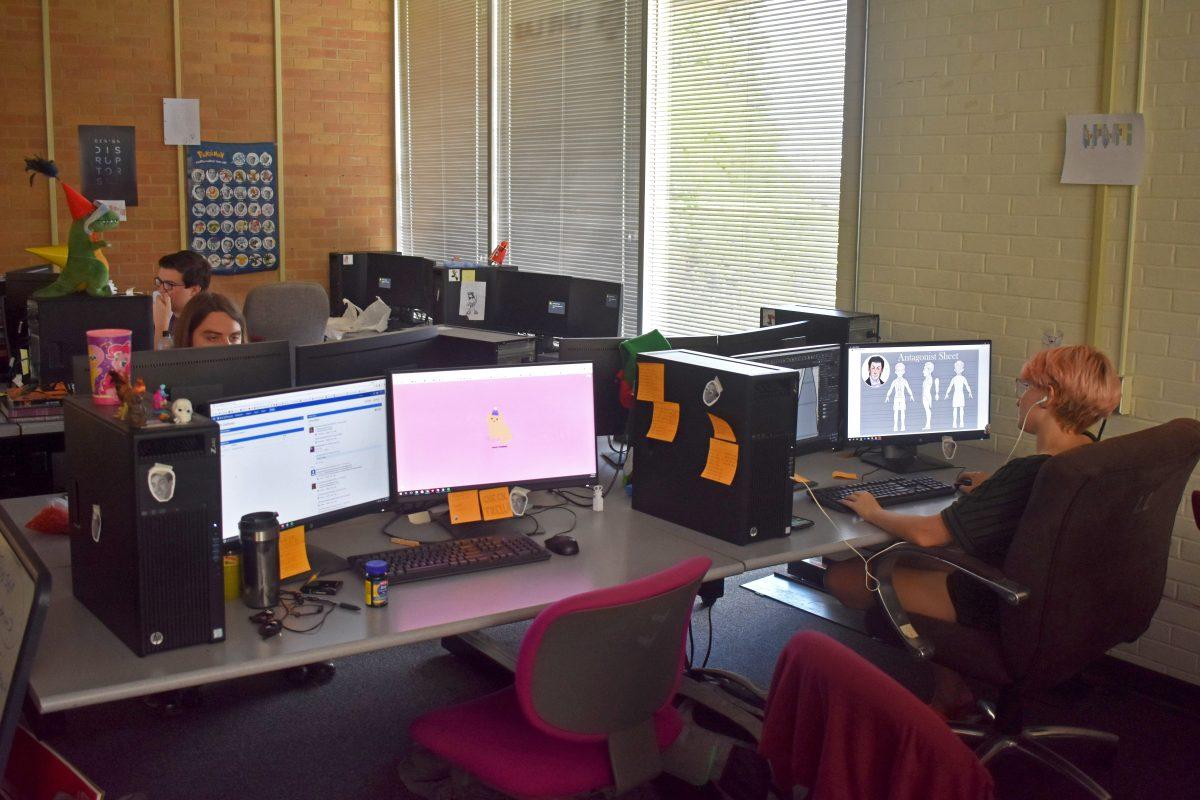There are several ways to earn credit at Texas A&M. Attending lectures, taking an online class, and now, credit hours can be earned by playing a video game.
ARTS 489: World of Medici can be taken for one credit hour over the course of four weeks. In the game, the player takes on the role of a merchant and banker for the Medici family, who were one of the most influential and powerful families in Europe during the Italian Renaissance. Over the duration of the course, students will learn about art, history, politics and economics, having a multidisciplinary learning experience.
The game, ARTé Mecenas, is run entirely in an Internet browser, so no special equipment is needed to complete the course.
ARTé Mecenas was developed at the Visualization Department’s LIVE Lab, led by André Thomas, director and founder of LIVE Lab and visualization lecturer.
“It started out before I ever joined the university, by one of our faculty, Dr. Spurge, unfortunately she is no longer with us,” Thomas said. “She and a couple of students started the development of the game to help students gain a deeper understanding [of the material] and provide deeper context.”
Thomas said that offering the course as game goes back to childhood development, when children learn by playing games instead of sitting in lectures.
“Any learning subject can be turned into a game,” Thomas said. “You can create a game around anything. Games and play have been around for a very long time. One of the most effective means of educating, we actually start with every child in kindergarten, they learn through play. At some point we put everyone in benches, and not so effective means of learning.”
Thomas added that the game’s effectiveness was proved through rigorous human research, both at A&M and Texas A&M-Corpus Christi, and when the game was assigned as homework, students would play it anywhere from two to four hours at a time.
According to Lila Campana, instructional assistant professor who is one of the professors for the course, the class has 70 total spots, 47 of which have been taken. Susan Sutherland, lecturer, attributed the class not being full due to it being added to the fall course catalog during the summer.
Part of the reasoning behind having the video game serve as a course is to offer students an alternative method of learning. Students will play through a level, watch a four part documentary, watch online lectures and then take a comprehensive test at the end of the game. 100 percent mastery of the test is required to pass, but students will have as many attempts as they need to do so.
“The game provides the opportunity to get students engaged with the course material in a way other than traditional lecture format or by reading a text,” Sutherland said. “This is both a way to motivate the student to learn and to enhance the learning experience. This will be particularly valuable for online courses. The class offers in-depth knowledge of a specific topic, so students can be immersed in the game while receiving instruction that adds to their knowledge.”
Another goal of the course is to provide an alternative to expensive textbooks. The game itself costs $25 to play, and includes all the necessary components to complete the course.
“We are trying to replace the textbook,” Thomas said. “Textbooks cost $300 and more. It’s a major pain. I have yet to see a single study that proves a textbook teaches, or is effective. We can prove with our games that it actually teaches and they are very, very affordable … If I have my way, all the textbooks will be replaced. But we won’t replace teachers.”
The game, which focuses on the Medici family, will include lectures about the Medici’s rise to power, given by Campana online. Campana is originally from Italy and an expert in maritime history, which gives her plenty of perspective to speak about the topic.
“The game focuses on the Medici Family from Renaissance Florence and their patronage in the arts during the 15th and 16th centuries,” Campana said. “As an expert in maritime history, I will deliver lectures on the global economies of the Mediterranean at the time, highlighting the political, social and historical dynamics and context. In particular, I will discuss the Medici Banco (the earliest bank ever created) whose branches where in the main city harbors of the Mediterranean, the Medici’s trade with the major European states and republics, their commercial networks that extended as far as the Levant with the Ottoman Empire, the Medici’s financial strategies and the role played by Florentine merchants, guilds, and commercial partnerships in the cosmopolitan trade of the Mediterranean during the Renaissance.”
Campana added that understanding how the Medici family operated is paramount to grasping how they became the wealthiest family in Europe, and how they were able to invest their wealth “supporting and sponsoring works of art and architecture as a form of political propaganda, thus dominating the cultural scene in Florence and beyond.”
Campana will deliver the lectures, while Sutherland will provide the documentary and assignments.
Thomas said that he hopes to have games available for all subjects available soon. He has helped develop a game that teaches calculus, which he said he hopes to have ready to offer by the spring semester.
The course is not meant to just appeal to visualization or art students, however. According the Campana, the wide variety of subjects covered will appeal to students of various disciplines.
“Given the multi-disciplinary nature of the knowledge background provided during the lectures, this course would appeal not only to students interested in games as a new learning tool, but also to students whose main interest lies in the field of history, economy, international studies, anthropology, etc,” Campana said.
World of Medici is currently only a one-hour credit, but Thomas said that he hopes, after revision and study of the course, that it will be offered as a full three-hour credit soon, and that he can help develop further games to be taught as courses.
Relive history with the Medici
September 20, 2017
Photo by Photo by Brad Morse
The game was developed in the Langford Building’s LIVE Lab. Both professors and students worked over the summer to ensure it was ready for the fall semester.
0
Donate to The Battalion
$2065
$5000
Contributed
Our Goal
Your donation will support the student journalists of Texas A&M University - College Station. Your contribution will allow us to purchase equipment and cover our annual website hosting costs, in addition to paying freelance staffers for their work, travel costs for coverage and more!










